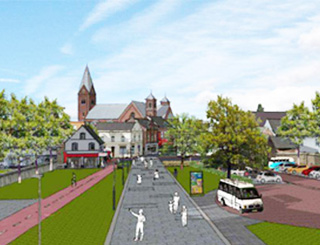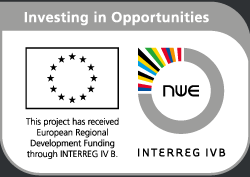When planning station improvements, engaging the community at the very start brings big benefits. Involving local people will help you to:
- Get a better insight into the life of the neighbourhood
- Focus on the end user and the “liveability” of the facilities
- Understand the background to any former decisions about the station (and reactions to those decisions)
- Make better connections with locally important issues – such as shopping, recreation or tourism
- Recognise the importance of public transport interchange in people’s lives
Consulting the community now will help you to avoid potential trouble later in the process and will lead to better solutions.

Inspiration

Eilendorf
Aachen (Germany)
As part of the Citizens’ Rail project, the local community in Eilendorf were asked their views about how their local station should be improved. At one event attended by approximately 50 local residents, our German partner organisations Stadt Aachen, AVV and RWTH Aachen University gave presentations setting out four different designs for the station. Residents then had the chance to ask questions and give their own views on each of the options.
The main reaction from the community was that they welcomed the chance to get involved in planning the improved station at an early stage. Their clear preference for a solution involving a bridge as opposed to a tunnel helped to confirm that this was the best way forward for the project. Read more.

Nuth
Parkstad Limburg (Netherlands)
When planning improvements at Nuth station in the Netherlands, the local community was involved from the start as part of the Citizens’ Rail project. Neighbourhood associations and representatives from business unions were asked to participate in working groups together with representatives from the regional authority (Parkstad Limburg), the province, the community and the public transport operator.
Parkstad Limburg also collaborated with Citizens’ Rail’s German partners to organise an international student masterclass to devise improvements at Nuth and Eilendorf stations. University students from all five Citizens’ Rail partner regions undertook site visits and worked in multi-disciplinary teams to come up with plans and ideas for the stations. The resulting concepts were impressive – with a focus on sustainability, eye-catching design and user-friendliness.
The success of the event led to a follow-up masterclass being held in Preston (UK). This time the focus was on rail marketing. The students again generated excellent ideas – some of which were implemented by the UK rail industry within just three months. Read more about Nuth station.

Kerkrade-West
Parkstad Limburg (Netherlands)
The regional authority, Parkstad Limburg, has teamed up with the local community to make plans for Kerkrade-West station to bring improved public transport and greater employment opportunities to this former mining neighbourhood.
As part of the Citizens’ Rail project, a “project group” including local residents and businesses has come together to work on plans for the station. Suggestions so far from the group include changing the local bus route so that it travels closer to the proposed station and shopping street, and connecting the station to scenic walking routes. Read more.
Hear from people who’ve done it
His view is that often community engagement happens far too late in projects. This casts doubt on how much real influence local people can have. In Parkstad Limburg, they take a more open approach. Representatives of local residents and businesses are asked to participate in project groups to make plans from scratch.
The result? Station plans that are broader, more imaginative and of higher quality.
How to make it happen
Try to engage all the stakeholders in your project as early as possible, from local residents and businesses to transport companies. Work as equals, and share problems, wishes, possibilities, expectations and plans.
If it’s not possible to involve all stakeholders at the very start, make sure to present and discuss plans while there is still time for improvements, changes, options and choices to be made. The process will only work if stakeholders feel that they are able to influence the project.
Be honest about expectations, budgets and possibilities for the future. Keep the trust of the stakeholders by doing what you say. Keep them informed about any scope changes.
Alongside early consultation through working groups or community meetings, try to enhance engagement by using other media. Use websites that offer users the chance to comment. Use Facebook, Twitter or other social media. Use local newspapers to inform people about plans and the engagement process. Also consider how you can involve citizens in the longer term.
Contribute

If you have your own case studies, resources or ideas to contribute to this (or any other) section of the toolkit, please get in touch.
Email our lead partner DCRP or call +44 1752 584777 to speak to our lead partner, the Devon & Cornwall Rail Partnership.
More from the toolkit
Site map
Toolkit homepage | Why get involved? | Contacts for volunteers | How the rail industry works
Improve existing stations
– Early consultation
– Designing with students
– Art and gardening projects
– Community-focused buildings
New uses for station buildings
Creating new stations
More trains, better stations
Attracting more users
Involving citizens and stakeholders








